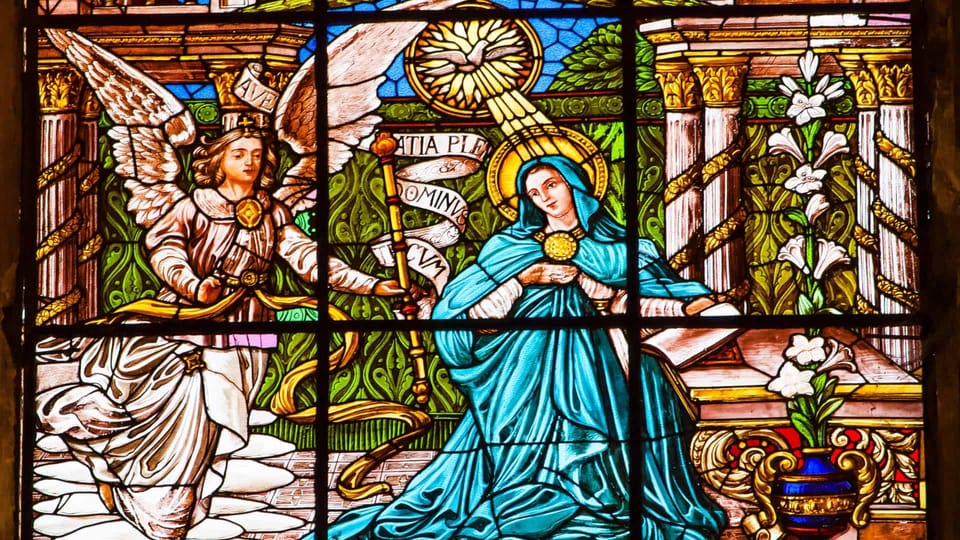The Music of Christmas (Luke 1:39-56)

Big Idea: Hear the music of Christmas: what God has done for people like us and in the world.
I’m a big believer in the facts of the gospel. One of the items on my wishlist is a big 336-page apologetics book that helps explain Christianity to skeptical people. The facts of the gospel are very important.
But we need more than the facts. We need the facts of the gospel, but we also need the music of the gospel.
There’s a saying out there: “Those who hear not the music think the dancers mad.” Just picture seeing dancers with the volume down. It would look mad. But once you hear the music, it would be madness not to dance.
I find it interesting that there are a lot of songs about the birth of Jesus in the New Testament, even though there aren't many songs in the New Testament overall. We know the facts of Christmas, but it’s as if the Bible tells us that the facts aren’t enough. We need to hear the music of Christmas.
So what’s the music?
When Mary went to visit her relative Elizabeth, Elizabeth was ecstatic:
Blessed are you among women, and blessed is the fruit of your womb! And why is this granted to me that the mother of my Lord should come to me? For behold, when the sound of your greeting came to my ears, the baby in my womb leaped for joy. And blessed is she who believed that there would be a fulfillment of what was spoken to her from the Lord.” (Luke 1:42-45)
Elizabeth knew: this was no ordinary birth. It’s astounding, actually. Elizabeth calls Mary the “mother of my Lord.” This is the first time that Jesus is referred to as Lord in the Gospel of Luke. Even before Jesus was born, it was clear that this was no ordinary baby. God is at work!
How does Mary respond to this? With a song. Why a song? Because words weren’t enough.
I want to invite you to eavesdrop on Mary’s song today and to hear not just the facts of Christmas but the music of Christmas. Here are two beautiful musical elements that we should listen for.
First: Hear What God Has Done for People Like Us (1:46-49)
The first part of Mary’s song is very personal. At first, it seems like it has nothing to do with us. Listen to the first words of Mary’s song:
My soul magnifies the Lord,
and my spirit rejoices in God my Savior,
for he has looked on the humble estate of his servant.
For behold, from now on all generations will call me blessed;
for he who is mighty has done great things for me,
and holy is his name.
(Luke 1:46-49)
Mary can’t believe that God has chosen her. She knows that she is nothing. Mary is probably a teenager. She’s unmarried. She lives in the middle of nowhere. She can’t believe that out of all the people that God has chosen, he has chosen her. She knows that her name will go down in history.
There is a sense in which this part of Mary’s song is Mary’s alone. Nobody else is like her. Nobody else will ever play the role that Mary did in salvation history. Her role is unique.
Mary's song contains references from the Hebrew Scriptures, including an event that happened thousands of years ago. In 1 Samuel, a woman named Hanna was childless. To be involuntarily childless is still very difficult today. It was considered one of the worst things that could happen to someone in Hannah’s day. Hannah prayed, and God gave her a child. How did Hannah respond? With a song.
When Mary sang her song, guess what she quoted? Mary’s song is a descendant of Hannah’s song. Both were mothers rejoicing at the birth of an unexpected child. Although the birth of Jesus is unique in some significant ways, it’s also consistent with how God loves to work. One commentator writes: “What God does for her, he does for the whole people…The ‘I’ who speaks in the hymn is both a particular individual, Mary, and the representative of God’s people” (Stephen Farris).
It also foreshadows how Jesus will operate in his ministry.
This is what God does for those who are low on the totem pole, and it foreshadows what Jesus will do in his ministry: healing the sick, exorcizing demons from the demonized, reaching out to and restoring the discredited sinners and friendless pariahs, and preaching good news to the poor.
…What God has done for Mary is an expression of God’s mercy on the people (2:10). It is the holy and merciful God who is to be venerated. To regard Mary as blessed is to praise God for what he has done for her because of what it means for us. (David Garland)
No wonder Mary sings!
When Mary says, “he has looked on the humble estate of his servant… he who is mighty has done great things for me,” she is speaking for herself — but she’s also speaking about how God generally works.
Here’s the lie we’re tempted to believe: God doesn’t care for people like me. God may care for other people, but he’s forgotten about me. He cares about other people’s problems, but not about me. But Mary shows us what God is like. God cares about us. Nobody has escaped his notice. God cares for those that others overlook. That’s just what God is like. He cares for you.
I want you to hear this music. Don’t just hear the facts. Hear Mary’s joy. God is the God who loves to give his grace to the lowly. Jesus is the friend of the lowly and humble. He chooses nobodies. He displays his grace to people who would never expect it, people that others would overlook.
In many ways, we have a better view of God’s grace to the humble than Mary did.
If you and I had orchestrated the plan of salvation, we would have recruited the brightest and the best. We would have looked for the most qualified and the most promising. We have a strong preference for the impressive.
But that’s not how God works, and Mary knows it, and it moves her to song.
But God chose what is foolish in the world to shame the wise; God chose what is weak in the world to shame the strong; God chose what is low and despised in the world, even things that are not, to bring to nothing things that are, so that no human being might boast in the presence of God. (1 Corinthians 1:27-29)
Are you low? Hear Mary’s music today. This is very good news for us. Hear what God has done for people like us!
But that’s not all. Here’s another musical element we should listen for.
Second: Hear What God Has Done for the World (1:50-55)
On July 16, 1999, John F. Kennedy Jr. was flying to Martha’s Vineyard. He checked in at the control tower, but then his plane never arrived. What Kennedy saw outside his plane window and what the instruments told him were two different things. Kennedy decided to go with what he saw, and it cost him his life. He experienced what’s called a disorientation accident.
In the dry parlance of the investigation, this is being called a 'disorientation accident'. Kennedy seems to have had a sudden attack of what pilots call 'black hole vertigo': a three-way disconnection between reason, instinct and reality – even an inability to tell the difference between up and down. (The Guardian)
Kennedy’s tragic accident is a metaphor for life. Sometimes it seems like this is a picture of the world. It’s upside-down. We face a continual battle between what God tells us is so, and what looks right and even normal in the world. We live in a state of disequilibrium. And it seems like a permanent condition.
But look at Mary’s song. A theme emerges as she speaks.
He has shown strength with his arm;
he has scattered the proud in the thoughts of their hearts;
he has brought down the mighty from their thrones
and exalted those of humble estate;
he has filled the hungry with good things,
and the rich he has sent away empty.
(Luke 1:51-53)
It almost seems like the world us upside-down sometimes. That’s because it is. But Mary says that God is going to turn things the right way again. He’s going to reverse things.
The circumstances in Israel were bleak. But Mary says that God will change all of that. And she’s so confident that she speaks in the past tense, like it’s already done. The proud, the mighty, and those who are self-sufficient will be brought low. Mary is reminding us that there are worse things than suffering. Being proud and self-sufficient, and independent of God, is far worse.
The good news: God will exalt those of humble estate. He will fill the hungry. God turns things upside-down, to exactly the way they should be.
A.N. Wilson says:
Why is it, the older one grows, the more topsy-turvy the wisdom of Christ appears; and yet the more it appears to be wisdom? He seems to be looking at life upside down; he tells us that the poor have security, the mourners will be happy, the sexually deprived will be the most fulfilled. It seems, by the wisdom of this world, as if we got everything the wrong way round. But live a bit, and one discovers that this is not necessarily the case at all. If the world is inverted, then the only way to see it clearly is upside down.
What’s really cool is that Mary is quoting from Psalm 113.
Who is like the LORD our God,
who is seated on high,
who looks far down
on the heavens and the earth?
He raises the poor from the dust
and lifts the needy from the ash heap,
to make them sit with princes,
with the princes of his people.
He gives the barren woman a home,
making her the joyous mother of children.
Praise the LORD!
(Psalm 113:5–9)
She knows that this is just like God. It’s not just something that God does sometimes. It’s God’s very nature to reverse things, and especially to give hope to those who’ve lost hope. This is just like God.
Here’s the lie we’re tempted to believe: that the world is irretrievably broken. And here’s the good news that Mary sings: that God is turning the world right-side up through Jesus. This is very good news to those of us who feel like the world has rolled over on top of us. God will set this world right again.
How does God do this? He does it through the one who was born. He does it through Jesus, who out of nothing but love left heaven for us. He not only left heaven but died to defeat evil and to deliver us from sin and death. This is great news for people like us. You have not been forgotten. God will set this world right.
Hear the music of Christmas: what God has done for people like us and in the world.
Friends, we need to hear the music of Christmas.
“Let us sing, first, because singing is the natural language of joy… because singing is the language of heaven… because singing is sweet to the ear of God,” says one preacher (Charles Spurgeon).





